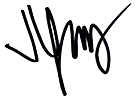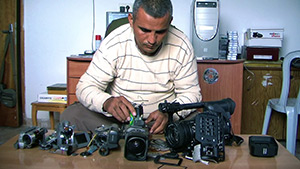The conflict in the West Bank has been going on for so long, in such familiar ebbs and flows, that one can hardly fault the exhaustion of Western attention. As intifada gives way to uneasy detente, as Arab Spring turns to Arab Fall, the perpetual strife in the Middle East comes to us as an abstraction that flashes for a few minutes on the evening news, or as truncated Twitter headlines that accompany unclicked links.
But what you're able to give us in the hundreds of hours of footage you shot over a five year period in your village, the Palestinian outpost Bil'in, is a humanity that such bite-sized bits of impartial journalism simply can't capture. The result is the Oscar-nominated documentary 5 Broken Cameras, which follows the fate of your farming community as it protests the construction of the West Bank barrier and fights against the encroachment of Israeli settlers.
Some of the images are familiar: the seasick shaking of the frame as the photographer flees from crackling flash grenades (a blur of feet and sky and fleeing faces); the street-level wreckage after a confrontation between protesters and security forces (flames and crumbled concrete and far-off wailing). But it's the moments in between these eerie scenes that are most striking. Only someone as close to the conflict as you would know well enough to seek them out, to linger, to let them play out. An Israeli special forces unit, undercover as Palestinian dissenters, reveal themselves by hurling the first stones during a peaceful protest. A protester, already in custody, cuffed, calm, is casually shot in the leg in the style of a summary execution.
In many of these moments, the camera is up close to the action; mere feet away (inches, in some cases), and captures an intensity of emotion that news cameras rarely do. What shows through, from this intimate vantage, is true impartiality, not merely the illusion of it: nowhere is this more evident than in the defeated, almost apologetic way that an Israeli soldier reads his eviction orders when you and your family are ordered to vacate your home in the middle of the night. Often you somehow manage to find a perch behind Israeli forces, and shoot from their point-of-view as they fire tear gas and rubber bullets into the fleeing crowd. This is no impartial piece of journalism (nor is it meant to be) but we get a sense - in camera perspective, at least - of what it's like on the other side of the fence.
This isn't a film meant to comment broadly upon the historical struggle for Palestinian statehood, either. It's about a very specific place, a very specific time, and very specific community of people. And through this relatively narrow perspective that the broader truth about the Arab-Israeli conflict is revealed. In this context, the sight of an olive tree engulfed in flames is evidence of an unspeakable atrocity; a single death, occurring with frightening speed and simplicity (a loud crack, a ragdoll collapse), is a proxy for the hundreds of thousands of deaths that preceded it.
Whatever parts of the film are manufactured (and only rarely do those seams show through, in too-convenient third-party footage and narrative bits built through self-conscious editing) are easily forgiven, if only for the fact that two of your cameras are destroyed during physical assaults, and two others are, literally, shot out of your hands. Even during the quiet moments you spend documenting the first years of your fourth-born son's life, danger is always present at the edge of the frame.
Midway through the film, you observe: "When I film, I feel like the camera protects me. But it's an illusion." The illusion, however, is ours: that the plight of the Middle East can be explicated through punditry and press-releases and 140-character summaries of political maneuvering. Only through the testimony of those involved is the truth fully revealed.
Sincerely,

Jared







